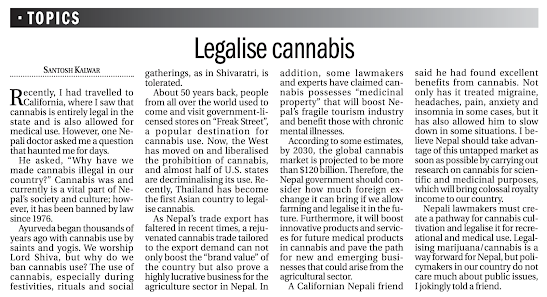Many
developing countries are presently facing severe environmental
degradation and health risk associated with mismanagement of domestic
waste. The overall status of garbage problems is now a challenging
ecological issue in Katmandu. Over the past decade, the Katmandu Valley
has encountered rapid population growth, dumping of garbage near water
bodies, unplanned waste disposal, excessive urbanisation, and an
imperfect solid waste management system. In addition, issues in the
reliable waste management systems have now encountered a lack of public
understanding of the stable waste system, unplanned urbanisation, the
introduction of environmentally unfriendly commodities, and changing
consumer habits.
Crucial role
The
Kathmandu Metropolitan City (KMC) is a tiny area with more than a
million individuals. The garbage management system is mainly a
door-to-door waste pickup service by KMC. Still, much garbage is
unmanaged and ends in rivers or dumped near streets. A landfill site
near Kathmandu is said to have already reached capacity despite a spread
of over 37.65 hectares. According to KMC, the Kathmandu Valley
generates about 853 tons of waste daily and 70,080 tons annually. The
Ministry of Urban Development (MoUD) plays a crucial role in developing
plans and policies, including sanitation and drainage. For Katmandu, the
KMC Office is the principal jurisdiction in executing the solid waste
management (SWM) system.
The majority of households (89 per cent)
want to segregate the organic and non-organic portions of their waste.
Lack of proper lining, raw solid waste from the city's dumpsites leaches
into river water, causing contamination and degrading the quality of
the water. Despite the initial effort made by the newly-elected Mayor of
KMC Balendra Shah, city dwellers are still facing many problems due to
garbage. Tourists suffer from the bad smell while passing the massive
piles of rubbish. Every day, the 18 municipalities in KMC generate over
1,200 metric tons of solid waste. Recently, as the Bancharedanda road
has been under construction, Kathmandu has now been unable to collect
garbage for several days.
With continuous growth in population
density and urbanisation, waste generation in Katmandu is rising
dramatically. In 2014, the Ministry of Health and Population had
identified SWM as the country’s most crucial challenge. There is only
one waste collection and transfer station at Teku, where wastes from
Kathmandu and other cities are transported. This station transports
waste to the Bancharedanda Landfill now. Kathmanduites have been facing
problems with garbage transportation during rainy and monsoon seasons
along the 27-km road that stretches to Sisdole and Bancharedanda.
Because of the rainy season and transport issues, the city uses 40,000
square feet of plastic tarp to cover the ever-growing garbage problem at
Teku transfer station.
The segregation of garbage is also a big
problem. Furthermore, many remote areas and slums of Katmandu do not
have sufficient financial capacity to collect and manage waste.
Moreover, open dumping is a common practice in Kathmandu. As a result,
waste is scattered on roads, drainage, and open spaces. To solve the
problem of garbage segregation, a pilot project was started in 2020 but
did not work correctly. Besides municipal solid waste, healthcare waste
is another major challenge for KMC. According to the Health Management
Information System of Nepal, within the small city of Kathmandu, the
number of registered public and private healthcare facilities (HCFs) in
2019 is more than 1,070 and combined with unregistered HCFs, the number
is around double, and these HCFs produce more than a ton of hazardous
wastes.
In addition, Metro City Waste Management picks up
on-hazardous waste generated from these HCFs. Still, no central
management system is practised for dangerous wastes in the KMC.
Moreover, few HCFs are individually practising incinerations for
hazardous waste; in many cases, body parts have been found to mix with
general waste. Nepal has adopted numerous legal facilitating regarding
solid waste management in KMC, for instance, Solid Waste (Management and
Resource Mobilisation) Act and rules, 1987, Solid Waste Management
National Policy, 1996, Solid Waste Management Act, 2011 and Solid Waste
Management Rules 2013. Despite having laws and policies, KMC has
considerably not guaranteed a sound management system primarily because
of a lack of economical implementation of actions and policies.
Eventually,
the garbage situation within Katmandu has reached a critical level. KMC
has now taken initiatives to work with private agencies for solid waste
management systems like private sector participation (PSP) as a crucial
role for SWM. But unfortunately, it is not working well due to
insufficient funding. According to the world population review (2021),
like other cities, Katmandu will protect its individuals by providing a
healthy environment, a good solid waste management policy and economic
opportunities. In some areas of Katmandu, private organisations and
local communities work together for waste management.
Suggestions
In
conclusion, KMC must integrate solid waste management from collection
to final disposal to minimise environmental impacts and facilitate clean
city and resource recovery materials. It is necessary to sort waste at
home before taking it to a waste container and create good collection
points and sorting containers. Sorting should be based on biowaste,
paper, cartoon, glass, metal, plastic, mixed waste. There is also need
to create separate collection points for hazardous waste, e.g.
batteries, broken computers, electrical equipment.
We should
learn from Scandinavian nations like Finland and Sweden on how to
implement an efficient waste management system where the overarching
mission is simple - to stop sending waste to recycling in the first
place. Finally, KMC must plan to transform the waste disposal system
from open dumping to an engineered landfill site which may require
investment with a commercial vision to address and align tech, policy,
and environmental possibilities. Hopefully, with everyone's concerted
efforts, Kathmandu will become garbage-free metropolis, where
sustainability and a smart city vision can prosper in the future.
Published: The Rising Nepal
Nepal's first English broadsheet daily














